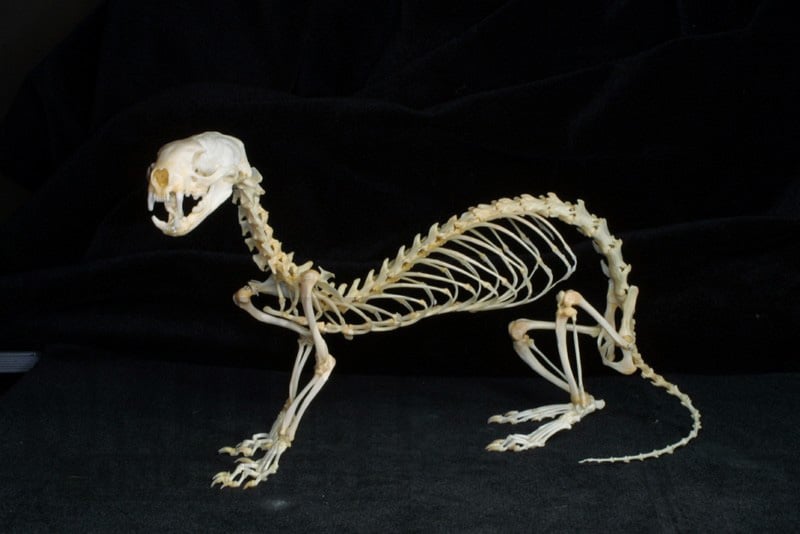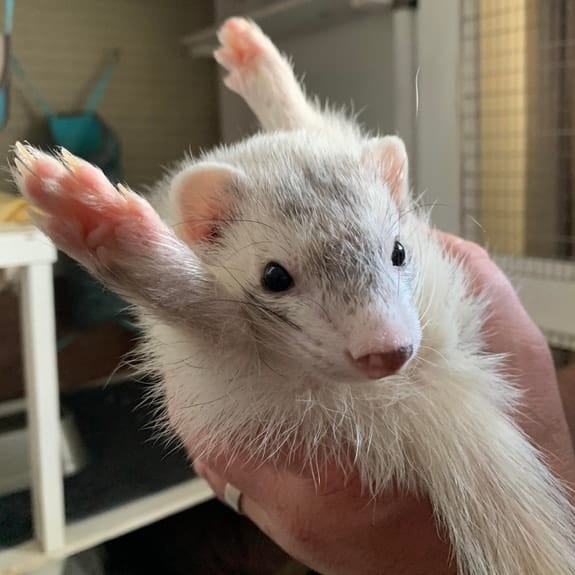Do ferrets have spines? If they do not, how is it possible that they are so bendy? After all, you can literally fold them together and twist their bodies in pretty bizarre shapes. If this is what you’ve been pondering, you’ve come to the right place. I was curious about the same thing, so I did some digging to come up with the answer.
This post is going to be all about ferrets and their spines. I will cover everything you need to know to give you a satisfying, fact-based answer.
What I discovered is that ferrets do indeed have spines, but unlike ours, it’s extremely flexible, which is why they’re so bendy. The fact that their spine is so bendy is an evolutionary adaptation that allows them to chase rodents into their burrows and tunnels underground when they are hunting. It also allows them to quickly change direction while they’re running.
To learn more about ferrets and their spines and to see some interesting photos, keep reading!
Do ferrets have a spine?
Ferrets do have a spine, but their spine is laid out very differently from our own. It is made up of many small bones that fuse together when they get older. In total, they have an average of 46 vertebrae. To get an idea of what their backbone looks like, take a look at this skeleton down below:

As you can see in the image, they do in fact have a spine that spans their whole body. Their spine is among the longest of all mammals relative to their size. The fact that their spine is so flexible also makes spinal or disk injuries very uncommon.
However, if they do get an injury to their spine it’s disastrous because they rely heavily on their spine to move around.
How are ferrets so bendy?
Ferrets are among the bendiest animals on the planet. When you first get a pet ferret it can be a really strange experience to see how flexible they really are. It definitely takes some getting used to because you’ll instinctively think you’re hurting him when his body is bending. Luckily, bending their body in weird shapes does not hurt them because they’ve adapted to do just that.

They are so flexible exactly because of the way their spine has evolved. Their vertebral column is very long and they have strong back muscles. They evolved to be this way because of how they hunt. Wild ferrets prey on many animals, but a major source of their food is rats, mice, and other rodents.
However, since these rodents usually try to escape by going into tunnels the ferret has evolved their spine in such a way that they’re able to traverse these tunnels. And not only that, their flexible body allows them to navigate these tunnels with extreme speed! They can go through these underground burrows fast enough to catch up to the rodents and eat them.
In addition, their ribcages are collapsable, yet another feature that makes them extremely adept at hunting in narrow tunnels!
Can ferrets break bones?
It’s a common myth that since ferrets are so flexible they are unable to break bones. This is false, every animal that has bones is capable of breaking them and ferrets are no exception. Wild ferrets break bones quite frequently, but they usually manage to survive.
In captivity, they can also break bones. For instance, if your pet ferret falls from a substantial height such as a closet, window, or out of your hands it can easily break its bones. If this happens,
If you suspect that your pet ferret has broken a bone I highly recommend you take them to a vet immediately to that he can get checked out. With proper care, your ferret will most likely recover.
Final words
As it turns out, it might seem that ferrets do not have spines due to how bendy they are, but that’s simply not true. One look at a ferret skeleton shows that they do definitely have a spine and many other bones.
The reason why they are so bendy is simply that they’ve evolved to have a very flexible spine because it helps them survive and catch prey!
- How Long Do American Eskimo Dogs Live? Important Factors and Care Tips - September 29, 2023
- Do American Bulldogs Need Grooming? Essential Tips and Care Guidelines - September 29, 2023
- Do Bengal Cats Enjoy Playing? Essential Tips for Keeping Them Active - September 29, 2023